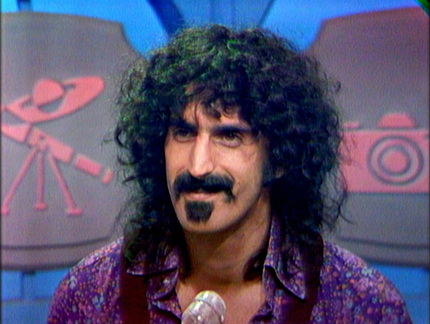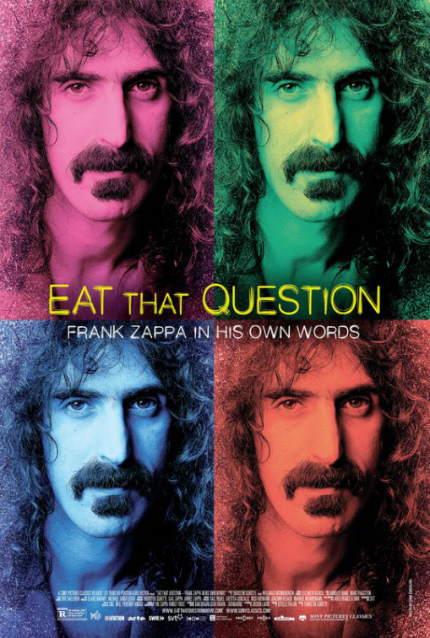Review: EAT THAT QUESTION - FRANK ZAPPA IN HIS OWN WORDS, A Service to a Musician's Legacy

It was somewhat startling to me when I lived in Europe several decades ago that the catchy, upbeat tune "Bobby Brown" would be played regularly on radio. Sure, it's got a good beat and you can dance to it, but, given that the song is about a rapist who is emasculated while echoing the American Dream, it seemed a little provocative for mid-afternoon tunes.
There's a certain masochistic challenge to being a Frank Zappa fan, to take everything in right from his Freak Out days through to the symphonic complexity of The Yellow Shark. His art shifted from "Louie Louie"-based three chord garage rock to noodling guitar solos to minstrel-like shows to Varèsian orchestral pieces, all somehow maintaining the unique character of the man.
It was once described to me that in the history of architecture there's a relatively linear line and then there's Gaudi, a genius who had few if any that followed him. You can go to Barcelona and marvel at the exquisite curvature and madcap design, but even the most avant garde design seems a far echo from what Gaudi accomplished.
Zappa fits this place in the rock pantheon - sure, there's loads of progressive metal bands that likely borrow a lick or two, and even a big pop hit like "Hey Ya" by OutKast borrows some of its polyrhythmicity from Frank, but generally the fact is this: there was rock and roll before Zappa, and rock and roll after him. While he was here, however, there was no one like him.
Political, puerile, precocious, Zappa's works for the most part demand a level of attention not common for pop music, and for other tunes a level of ignoring what otherwise would be considered racist, sexist, or simply tasteless lyrics. The key, as he often claimed, was to understand it all as a facet of a whole, a master work where the three-chord on the downbeat crunch was as relevant as the 17/8 spasmodic flourish. It's all just Zappa.

Eat That Question: Frank Zappa In His Own Words tries admirably to present this vast array of contrapuntal contradictions by using decades of interview footage by Zappa as its basis. Early on, we're reminded that Zappa saw interviews as yet another performance, providing often inaccurate or shifting views on given subjects.
Key elements of his passions, from his introduction to Varèse's Ionization on up, will be old hat to old fans of the man, but as a primer of his diverse output, it's a supremely inviting way into his work like no other. The enormity of his output (over 100 records) makes it daunting for many people, and it's fair to say the likes of "Bobby Brown" or "Valley Girl" aside, he wasn't particularly known as a singles artists.
As a man who pricked the bubbles of Beatlemania and hippiedom in the 60s, through to his scathing attacks on Nixon, the moral majority and televangelists, through to his passionate advocacy against the PMRC rating of records, Thorsten Schütte's assemblage does a fine job of allowing Frank Zappa's own words to do the heavy lifting in contextualizing all these disparate elements.
Yes, there's some stellar concert footage interspersed, but while there are a few rare nuggets, a lot of it is readily available elsewhere. So the real pleasure in Schütte's film is how deftly he manages to provide both chronological and thematic consistency throughout, making sense of his work in a way few people have ever tried in so succinct a fashion.
I was reminded of The Kids Are Alright, a powerhouse documentary on The Who that also used a smattering of archive footage to provide an overview of a band's career. Schütte manages to include elements both expected and surprising, allowing jaded fan and neophyte alike a window into Zappa's world.
To truly tell Zappa's story would require a mini-series length, and a Scorsese-style examination with provocative interviews would be probably too much to hope for in the near term. Yet as his music slips away from popular consciousness, as his siren calls about the rise of fascism in both the left and the right, there may be opportunity for new fans to explore the myriad facets of Zappa's music and performances. By giving us Zappa in his own words, Schütte has done a service to the man's legacy and provided a highly entertaining film at the same time. Eat that, naysayers.
Review originally published during the Sundance Film Festival in January 2016. The film opens in select theaters on Friday, June 24 via Sony Pictures Classics. It will roll out to other theaters in the following weeks.







